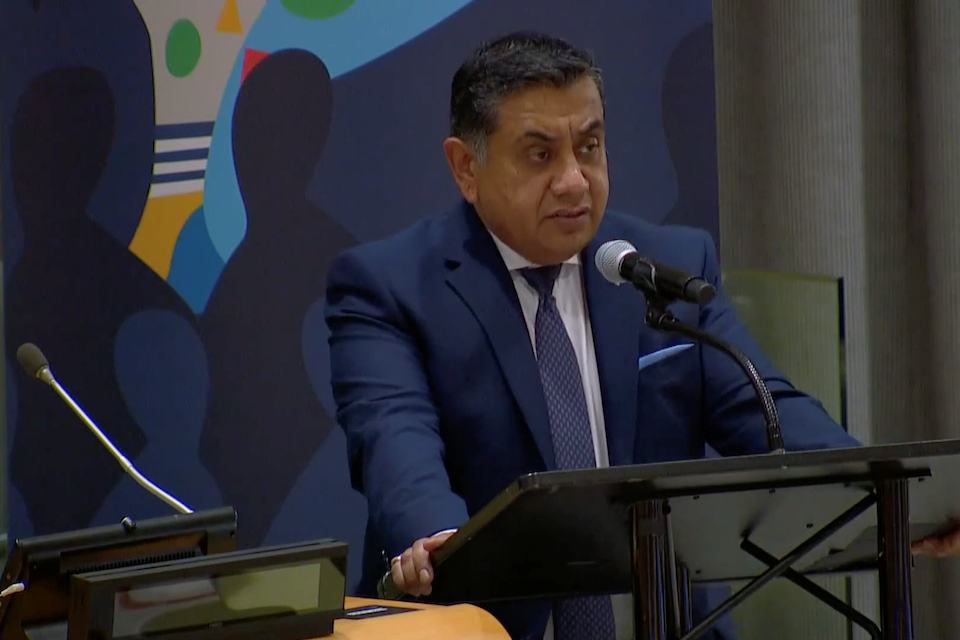Turning thirty year old commitments on minority rights into reality for all: Lord Ahmad statement at UNGA
Statement by Lord (Tariq) Ahmad of Wimbledon at the High-Level Meeting on the Rights of Minorities

Your Excellencies, three decades on from this historic Declaration, members of minority groups in many places, tragically, around the world continue to live in fear.
Citizens in countries face hatred. Why? Because of their race or their religion, the place they were born or their ethnicity, even because of the language they speak.
Members here tonight, this evening, this afternoon, this morning have been united and are committed to change, and today is an opportunity to reflect and make pledges on what we can do collectively.
The United Kingdom’s resolve is reflected in our landmark Inclusive Britain strategy, bringing together over 70 preventative and remedial actions to tackle racism or discrimination, be it in education, health, employment and in the criminal justice system, and indeed in public life as well.
And I want to just share two particular examples. When we look at the issue of religious hatred, I am proud of the fact we have supported organisations such as our Community Security Trust, a charity which specifically protects British Jews from racism and antisemitism. And indeed our funding of the Measuring Anti-Muslim Attacks programme, which supports victims of anti-Muslim hatred in the UK. And I’m proud of the fact that we have also laws which protect not only religious freedom or belief, but also allow victims of crimes who have been targeted because of their religion or belief to report them as such. So if you are attacked as a Muslim, a Sikh, a Hindu or a Jew, you can go to your police station and report that crime as a religious hate crime. And as we bolster our efforts domestically to combat hatred at home, we pledge to clamp down on racist abuse online. This is a real challenge we are now facing, and we are doing this through our Online Safety Bill.
And internationally, we pledge to continue working with you, including through the United Nations to uphold international law. But I now wish to touch briefly on country situations as well. There are many parts of the world that tragically we see discrimination rife amongst the country.
Discriminatory provisions within citizenship laws, for example in Myanmar, where the Rohingya community, according to the laws of Myanmar don’t even exist. And other minorities face persecution. And in the case of the Rohingya specifically it culminates itself in ethnic cleansing.
The systematic discrimination, harassment, and targeting of members of minority communities in Iran, such as those of the Baha’i faith.
And we see in Afghanistan, where the Taliban have continued to target particular minority communities, including Sikhs, Christians and of course the Hazaras. And we call upon the Taliban to respect the law, respect the rights of their own constitution. Indeed respect the rights of the very faith they claim to follow which safeguards the rights of all minorities of whatever faith or belief they may be.
And if I may finally turn to the former High Commissioner’s recent report on Xinjiang. We are deeply concerned, indeed it is a great concern to all of us when we see the harrowing evidence which it provided of China’s human rights violations in the region, particularly against the Uyghur Muslims, including actions that , and I quote from the report, “may constitute international crimes, in particular crimes against humanity”. This also includes credible evidence of arbitrary and discriminatory detention, torture, sexual and gender-based violence, and the destruction, tragically, of religious sites. I know there are many in this room who share our concerns and join us in urging China to accept the report’s recommendations.
Finally Mr. Chairman, I end by just saying that when we stand here in the United Nations it is incumbent on not just all of us to not just talk but act. Because everyone, everywhere, deserves the freedom to enjoy their culture, practise their religion and speak in their mother tongue. This should be celebrated, and I am therefore greatly encouraged by pledges made by many members and hope that we will collectively work together to turn the words of this Declaration into a reality for all.